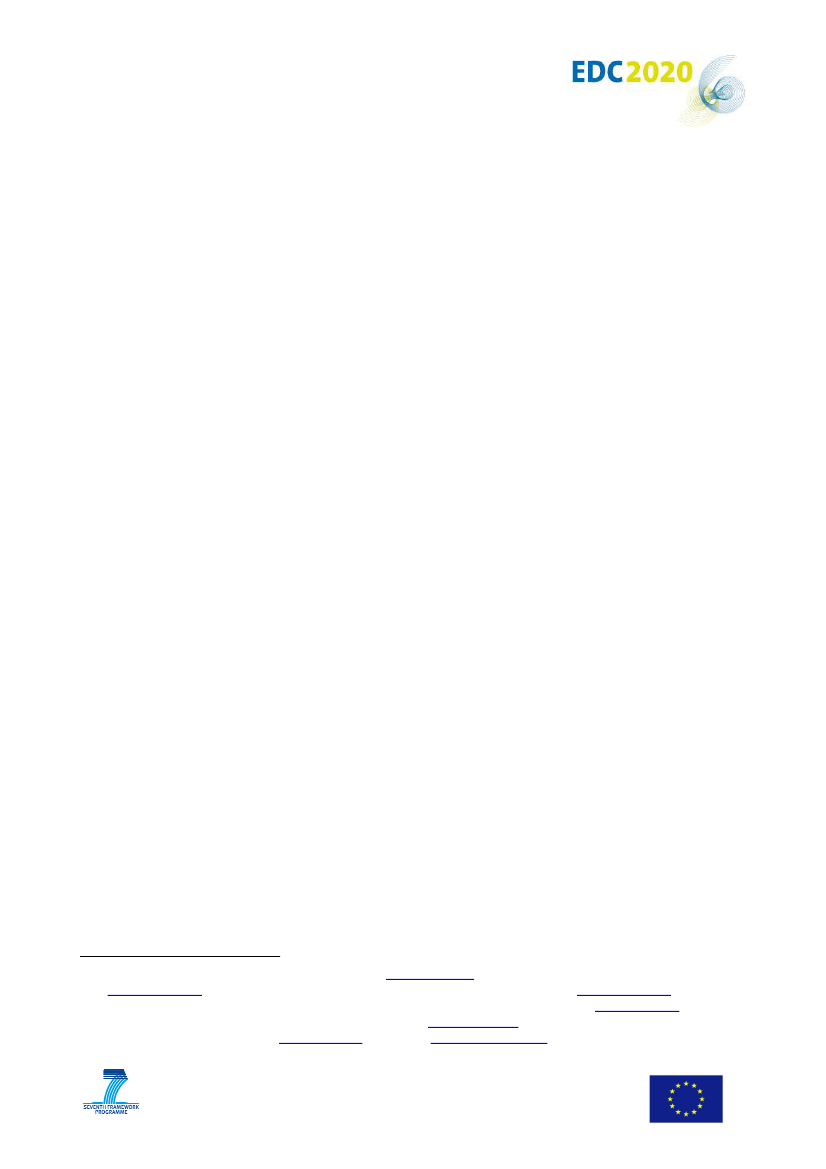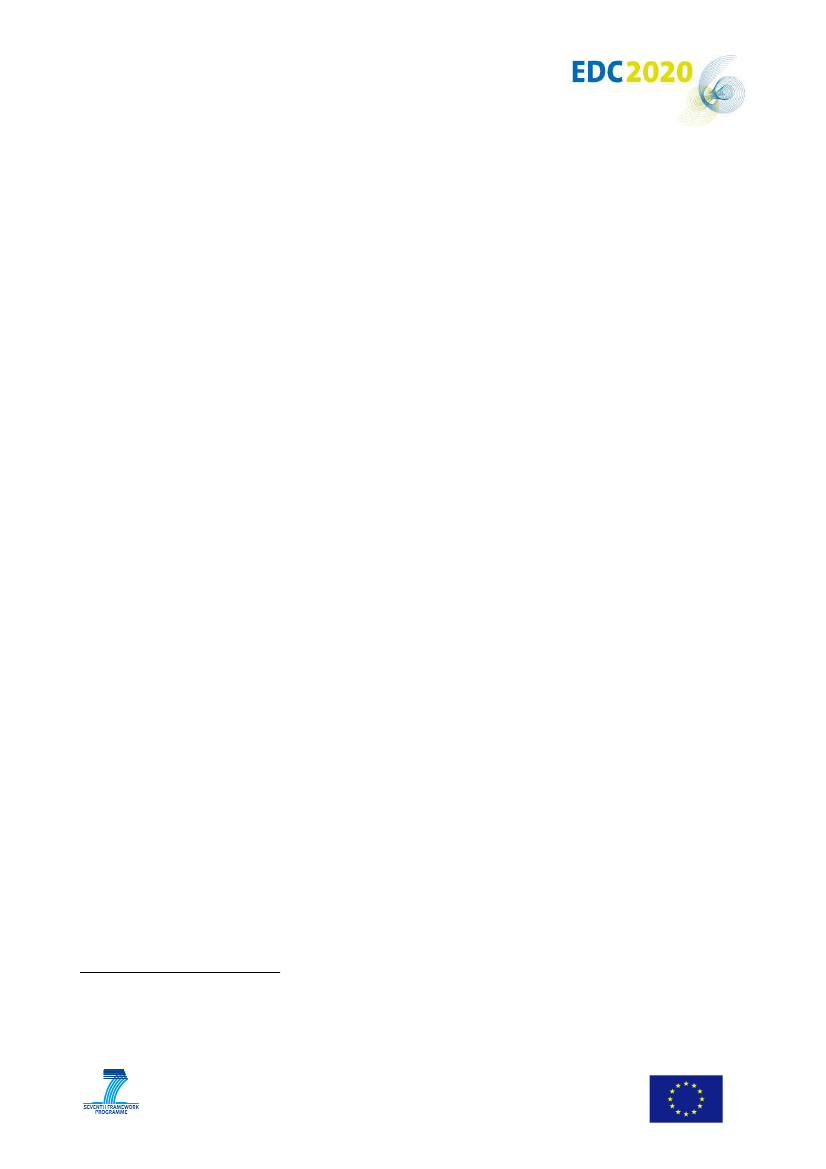Udenrigsudvalget 2010-11 (1. samling)
URU Alm.del Bilag 79
Offentligt
European Development Co-operation to 2020 [EDC 2020]
The EDC 2020 project combines both research and communication aspects. Its aim is toencourage close collaboration between researchers and policy makers and therefore it enhancesthe co-operation with reputable European Development Research Institutes such as IDS, ODI, DIEand FRIDE but also with SID1as a dissemination partner in order to reach practitioners directlythrough various policy briefings and workshops. The project is coordinated by EADI, the EuropeanAssociation of Development Research and Training Institutes2.BackgroundIn Europe’s relations with developing countries, new and interconnected issues of global natureare emerging. These include new players in international development, Europe’s energy securityand climate change. All these discussions take place in times of wide-ranging global challenges,and at a time, when questions of European identity loom large in national debates.It is crucial that decisions and policies on emerging matters are based on good research andsound evidence. Moreover, the public debate needs to be informed by research voices.European Development Co-operation to 2020 (EDC 2020) therefore aims at improving EU policymakers’ and other societal actors’ shared understanding of emerging challenges facing EUdevelopment policy and external action. The project is funded by the European FrameworkProgram (FP7) and organised around three major topics.New actors in international developmentRapidly growing developing countries such as China, India and Brazil do not only gain economicinfluence but also emerge as new actors on the international development landscape. These ‘newactors’ follow a distinct agenda which often conflicts with OECD/DAC agreements. Thus, theirengagement in least developed countries does not fulfil ODC criteria for development assistance.Instead, new actors use specific funding instruments, trade relations as well as investment ininfrastructure which are often paid “in kind” with exploitation concessions for specific resources. Inthese engagements the boundaries between profit seeking private investment and public policyare unclear, as well as the effectiveness of the instruments for the development of the recipientcountry. Research regarding rationales, interest groups and policy processes of these new actorsare vital in creating new tools and scenarios for European policy makers. Only with such insightscan new areas of convergence be found and strategic partnerships for effective development co-operation be formed. Open questions, crucial for the EU’s policy response, remain:•••Is rich country policy on poverty reduction driven by genuine concern or by self interest?What is the rationale of new actors in aid provision, the choice of partners and the level ofaid?Where are challenges in partners’ positions for European external relations or where mightpoints of convergence emerge?
Institute of Development Studies, Brighton, UK (www.ids.ac.uk); Overseas Development Institute, London,UK (www.odi.org.uk); Deutsches Institut für Entwicklungspolitik, Bonn, Germany (www.die-gdi.de);Fundación para las Relaciones Internacionales y el Diálogo Exterior, Madrid, Spain (www.fride.org); Societyfor International Development, The Hague, Netherlands (www.sid-nl.org).2For further details please see:www.eadi.orgor write to[email protected]
1
Project funded under the Socio-economic Sciences and Humanities theme
Energy security, democracy and political developmentIn its 2006 Green Paper, the European Commission noticed that an increased linkage betweenenergy policy and development policy is necessary. “Europe has entered into a new energy era”and the “increasing dependence on imports from unstable regions and suppliers presents aserious risk… [with] some major producers and consumers…using energy policy as a politicallever3.“ However, so far energy security remains a subject studied by energy (political) economistsand is not integrated into the normal purview of work on foreign, security and developmentpolicies. EDC 2020 therefore addresses this issue and aims at correcting these shortcomings andcreating scenarios to the questions:••••What are possible combinations of energy, development and Common Foreign SecurityPolicy (CFSP)?What is the relationship between Member States’ and EU interests regarding energypolicy?How can a practical balance between access to energy policies of poor communities andown supply concerns be achieved?Is the EU striking the right balance between free market and geopolitical approaches?
European development policy and climate changeClimate change has become a considerable part of European policymaking. Much of the effort hasso far been focussing on dealing with emissions from European countries, getting the EUemissions trading system to work, setting ambitious renewable energy policies, and negotiatingEurope’s role in the international climate regime. However, it is only relatively recent that therelationships between climate change and development have been discussed in developmentpolicy circles. In its Green Paper the Commission emphasized in 2007 that it “is examining how topromote an enhanced dialogue and co-operation between the EU and developing countries onclimate change4.” EDC 2020 will support European policy makers by concentrating on two policyfields.••
What are the implications of domestic policy processes (promotion of bio-fuels) which havelinks to developing countries?What are implications of policy processes designed specifically to support developingcountries in dealing with climate change (financing for adaptation and mitigation,technology transfer etc)?
Commission of the European Communities (2006): Green Paper. A European Strategy for Sustainable,Competitive and Secure Energy, COM (2006) 105, 8 March 2006, p. 34Commission of the European Communities (2007): Green Paper. Adapting to Climate Change in Europe –option for EU action, COM (2007) 354, 29. June 2007, p. 23
3
Project funded under the Socio-economic Sciences and Humanities theme


